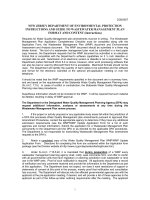The business guide to credit management Jonathan Reuvid
Bạn đang xem bản rút gọn của tài liệu. Xem và tải ngay bản đầy đủ của tài liệu tại đây (4.35 MB, 225 trang )
i n
the business guide to
Credit
Management
n ii
Cash in
on our
experience.
Making change happen is one thing;
making it stick is quite another.
Many businesses have made cash
their focus, but maintaining results
depends on management leading
and embedding behaviours across
the entire business.
Talk to us about how to maintain
cash behaviours, and how we can
help you stay ahead.
Visit us now at pwc.co.uk/rmg
© 2010 PricewaterhouseCoopers LLP. All rights reserved. ‘PricewaterhouseCoopers’ refers to PricewaterhouseCoopers LLP (a limited liability partnership in the United Kingdom) or, as the
context requires, the PricewaterhouseCoopers global network or other member firms of the network, each of which is a separate and independent legal entity.
iii n
thE businEss guidE to
Credit
Management
Advice and solutions for
cash-flow control, financial
risk and debt management
Consultant Editor:
Jonathan Reuvid
RECOMMENDED BY
I NST IT UT E OF D I R EC TORS
n iv
This book has been endorsed by the Institute of Directors.
The endorsement is given to selected Kogan Page books which the IoD recognizes as being of
specific interest to its members and providing them with up-to-date, informative and practical
resources for creating business success. Kogan Page books endorsed by the IoD represent the most
authoritative guidance available on a wide range of subjects including management, finance, marketing, training and HR.
The views expressed in this book are those of the authors and are not necessarily the same as those
of the Institute of Directors.
Publisher’s note
Every possible effort has been made to ensure that the information contained in this book is accurate at the
time of going to press, and the publishers and authors cannot accept responsibility for any errors or
omissions, however caused. No responsibility for loss or damage occasioned to any person acting, or
refraining from action, as a result of the material in this publication can be accepted by the editor, the
publisher or any of the authors.
First published in Great Britain and the United States in 2010 by Kogan Page Limited
Apart from any fair dealing for the purposes of research or private study, or criticism or review, as permitted
under the Copyright, Designs and Patents Act 1988, this publication may only be reproduced, stored or
transmitted, in any form or by any means, with the prior permission in writing of the publishers, or in the
case of reprographic reproduction in accordance with the terms and licences issued by the CLA. Enquiries
concerning reproduction outside these terms should be sent to the publishers at the undermentioned
addresses:
120 Pentonville Road
525 South 4th Street, #241
London N1 9JN
Philadelphia PA 19147
United Kingdom
USA
www.koganpage.com
4737/23 Ansari Road
Daryaganj
New Delhi 110002
India
© Kogan Page, Jonathan Reuvid and individual contributors, 2010
The right of Kogan Page, Jonathan Reuvid and individual contributors to be identified as the authors of this
work has been asserted by them in accordance with the Copyright, Designs and Patents Act 1988.
ISBN
978 0 7494 5978 9
E-ISBN 978 0 7494 5979 6
British Library Cataloguing-in-Publication Data
A CIP record for this book is available from the British Library.
Library of Congress Cataloging-in-Publication Data
Reuvid, Jonathan.
The business guide to credit management : advice and solutions for cost control, financial risk
management and capital protection / Jonathan Reuvid. – 1st ed.
p. cm.
ISBN 978-0-7494-5978-9 – ISBN 978-0-7494-5979-6 1. Credit–Management. 2. Cost control. 3. Risk
management. I. Title.
HG3751.R48 2010
658.8'8–dc22
2010005213
Typeset by Saxon Graphics Ltd, Derby
Printed and bound in Great Britain by MPG Books Ltd, Bodmin, Cornwall
v n
n vi
vii n
Contents
List of Contributors
Foreword by Miles Templeman, he Institute of Directors
Preface by Philip King, The Institute of Credit Management
Introduction
Jonathan Reuvid
xvi
xxi
xxiii
1
Part 1: Back to basics
3
1.1
Keeping control of your cash flow
Ross McFarlane, RBS Invoice Finance
1. Approve new customers 6; 2. Fund invoiced sale 6; 3. Collect
invoices and credit control 7; 4. Protect from insolvency and bad
debts 7; 5. Management information and constant attention 7
5
1.2
Do you have the courage to establish cash-generating behaviours in
your business?
12
Niall Cooter, PricewaterhouseCoopers
What does good look like? 12; What behaviours do we see in
underperforming companies? 13; Where do these undesirable
behaviours come from? 14; How do we change behaviour? 14;
What are we hoping to see from this change? 16; Do you have
the courage to make change happen? 17
1.3
National debt (business to business) UK
Graham D Sands, Amril Limited
Cash flow and its importance 19; Credit control 20; Personal
relationships 21; The roles of staff and management 22; Payment
practices 23
19
n viii Contents
1.4
Paying on time is good for business – the prompt
payment code
Philip King, The Institute of Credit Management
26
Part 2 Improving cash flow
31
2.1
Preventing slow payments: do not suffer in silence
Martin Williams, Graydon UK Ltd
General principles 34; How to improve cash collection 34;
Summary 37
33
2.2
Bill payment by direct credit – the importance of accurate
referencing
Peter Finlayson, UK Payments Administration
Introduction 39; Bill payments 40; Best practice guidelines 43;
Next steps 46; Note 46
2.3
The search for solid ground – outsourcing to stabilize your
debt management performance
Mike Purvis, Transcom Worldwide (UK)
Introduction 48; A unique bind 50; Managing customers or
pursuing debt 51; Analysing the risk 51; Building flexibility 52;
Buy ‘results’ 52
2.4
The collections industry
George Miles, Paladin Commercial Credit Management
Introduction 55; The collections industry 56; Debt sale and
purchase 56; Invoice discounting 57; The collectors 57;
Petition 58; Collectability Index 59; Conclusion 60
55
2.5
An introduction to debt sale and purchase
Joyce Newman, Lowell Group
The benefits of debt sale 63; Market development 63; The sale
process 64; Optimizing collections 65; Regulation and treating
customers fairly 65; The future 66
62
Part 3 Innovation and success in managing credit
3.1
Proactive credit management is key for successful customer
relationships and business continuity
Maarten de Wild, OnGuard Credit Management Software
The role of credit management 72; The reasons for failure 72;
Profitable credit management 72; What priorities are required:
eight tips 73; Conclusion 80
39
48
69
71
ix n
Need a
helping
hand?
Trace a debtors new address, debt collection,
employment status reports & pre-sue reports
Visit us at www.traceadebt.com
for more information or call 01273 621705
19792_COL HP AD.indd 1
05/03/2010 12:12:44
Traceadebt.com is powered by Vilcol, one of the
UK’s leading trace & debt recovery companies.
Vilcol operate the broadest range of debt collection & credit management services
across every type and size of business.
PREMIER SUPPORT SERVICE - for credit control departments
Vilcol offer a premier support service for credit control departments in the corporate
market place. Incorporated in 1988 Vilcol has been in business for twenty one years.
Their debt recovery and investigations rank in the top 10 of over 800 agencies in
the UK. That has put approximately £12 billion a year back into the hands of the
rightful owners companies. This helps to ensure other people’s jobs, in effect a vital
component in the engine room of the economy.
Vilcol partners with organisations to recover their overdue accounts and bad debt
according to the client’s own criteria. One of the most successful new methods of
chasing payment is to incorporate that goal within a customer care approach. This
worked at Vilcol and reduced our late payers by 20% straight away. Telephoning to
confirm prompt delivery and the quality of your product establishes early the nature
advertisement feature
n x
of any disputes. In many cases this improves customer retention. Most external
agencies are traditionally used as a last resort, but Vilcol has found that being used
this early increases the overall collections success rate by a factor of between 8-10
times, compared to tertiary work from the same client.
OUR PEOPLE
The 51 staff based in Surrey is the backbone of the business. They make it work.
Vilcol pays a lot of attention to its people. When other similar business were getting
into price wars and firing staff to reduce costs, Vilcol chose instead to focus on its
people and develop the best customer care package in the industry.
This meant that they had to invest a lot in terms of time, money and technology. This
does not mean that as an organisation they are foolproof, but the business objectives
for 2010 is to get things right the first time. With a series of incentives and a no ceiling
on income policy, the people at Vilcol are highly motivated to do their very best.
As an example, the trace manager completed a Dale Carnegie Management Course;
the collection manager became a member of the Credit management institute. Six
agents in the debt recovery team at the same time asked to take the NVQ in Debt
Recovery Course. There is a continuous improvement culture in Vilcol it is a believer in
lifelong learning.
OUR AIMS
Steve Rowlands the Managing Director of Vilcol says, “We aim to provide the best
service possible to all - our staff, our partners and their customers. For example, we
recognise that not every debtor has a bank account, so we invested in the Vilcol Easy
payment Card System, a simple payment system that allows a certain type of debtor
to pay their bills at the local corner shop, post office, etc. Our commercial debtors are
also offered a full payment facilities, including company credit card acceptance (at no
charge to the client) and instant payments by BAC’S. In fact Vilcol has signed up to
the Better payment Practice Code which is another way to collect debts, interest and
collection costs.”
“We make it as easy as possible for people to pay. By doing so, we help
the debtor; we help the customers because they get more of their money
back and we help ourselves, because we continue to gain revenue; a win,
win situation.”
“By paying attention to everyone’s needs, I believe we will continue to
outperform all our competitors, all of whom are considerably bigger than
us, and gain a ranking in the top five. Not bad for an agency that, only
three years ago, was ranking around 247. I believe we can and so does
everyone who works here. The team spirit is, in my opinion, probably the
best in the industry.”
advertisement feature
xi n
OUR SUCCESS
Steve Rowlands will continue to serve on a government advisory committee for
Small Businesses. Vilcol also represents the credit industry on the CBI committee
consulting with the Home Office on the introduction of new national Identity Card.
In 2007 Vilcol was nominated for a Business Achievement Award for ‘Services for
Debt Recover 2007’ by Today Magazine. Steve said that, “I am more pleased that
we have been re-accredited for both ISO 9001-2002 and Investing In People, than
winning a new business award. This shows that our people continue to produce
quality work and give customer satisfaction, you can win only so many awards”
Vilcol won the British Small Business Champion Award 2002 for southern England.
Prior to attending the awards ceremony, Steve met the Prime Minister and Small
Business Minister, Nigel Griffiths, at 10 Downing Street for a reception to mark the
achievement of all the finalists.
Nigel Griffiths said: “Steve typifies the British small business managing director –
someone that does not often get the headlines but is one of the unsung heroes of
the economy. That is why I’m delighted to support these awards. Being a finalist gives
business like Steve’s the recognition it deserves. Both the Prime Minister and myself
congratulate Steve on his nomination.”
Vilcol were finalists in the 2008 debt Collection Agency of the year sponsored by the
Credit Today Magazine.
Since the start of the millennium Vilcol has won 6 business awards.
WHAT IS NEW IN 2010?
Vilcol is continuing to establish its specialist agency status, in the UK debt collection
market as many of its competitors unfortunately go out of business.
Why is Vilcol better at recoveries than the competition? We use our well-known
skill at manually tracing persistent debtors in combination with the plethora of
new public domain Internet search engines to give the best tracing results. While
continuing to develop the ability of our people, to negotiate with debtors to get
part payments as more and more people want a slice of their out goings. Our
recovery team also agrees significantly higher settlements and more payments in
full, than most of our rivals.
Our new method of negotiating settlements has significantly improved our collection
success rates. Especially when combined with our revolutionary new way of paying
clients quickly, called Advance Collection Payments which is Vilcol’s alternative to
debt purchase.
Vilcol and Vilcollections are the trading styles of Village Investigations Limited, which
is a wholly owned private company. It is not part of a group of companies.
advertisement feature
n xii Contents
3.2
A new generation of financial rating services
Xavier Denecker, Coface – UK & Ireland
Introduction 82; Better practice in financial ratings 83; The new
Coface financial rating 86; Summary 86
82
3.3
The new ways to contact debtors
Shaun Maloney, TALKINGtech
Public acceptance of IVM 90; Why choose voice messaging? 90;
Know your debtors 91; Promise to pay – making them count 91;
Welcome calls – the credit process starts here 93; Summary –
new contact strategies 94
89
3.4
An overview to improving cash flow
Simon Hampton, TAK-Outsourcing Limited
Approach and scope 97; Credit policy 98; Collection
strategy 98; Collection process 99; Escalation 99;
Debt recovery 99; Implementation of change 100;
Successful outsourcing 100
96
3.5
Securing a job in the credit and collections industry
Brett Marlow, Jobs In Credit
Your CV 102; Job hunting 103; The interview 104; The wait 106;
Recruiting staff 107
102
3.6
Providing a profession service
Vernon Phillips, High Court Enforcement Officers Association
Introduction 110; Background 110; Procedure 111; Cost of
enforcement 113; Power and responsibility 113; Additional
services 114; Conclusion 115
110
Part 4 Customer management
117
4.1
Soft debt collection – collecting money without alienating your
customer
119
Stewart Lund, Resolvent Ltd
‘Speak softly and carry a big stick’ 120; How soft debt collection
affects customer relationships 120; Surely I can do this on my
own? 120; Choosing a representative 121; Process 121; Future
dealings 122; Soft debt collection in practice 122; Summary 124
4.2
Customer insight – knowing your customer to help reduce your
credit risk
126
Amy Slayford, Aon Trade Credit
Introduction 126; Know your customer 128; Solutions to help
you manage credit risk 131; Conclusion 132
Contents xiii n
4.3
Debt collection – the right attitude
Zoe Lacey, Mint Credit Management UK Ltd
Introduction 134; Pre-delinquency management 135;
Outsourcing solutions 135; The approach of a debt collection
agency (DCA) 136; Litigation 136; Summary 139; Notes 139
134
4.4
Debt recovery and litigation strategies in recessionary times
Trevor Philips, Lovetts
The problem 140; Does the debtor have a valid dispute? 141;
Give yourself priority status 142; Avoid wasting money 145
140
Part 5 Credit management for export markets
147
5.1
Cross-border debt recovery – breaking down the barriers
John Holmes, Bierens Incasso Advocates
The dilemma 150; The EOP procedure 150; Execution of an
EOP 151; Alternatives to the EOP in the EU 152; Advantages and
disadvantages to the EOP 152
149
5.2
International credit management and debt collection – the use of
technology in debt collections
154
Charles Mayhew, Moreton Smith Limited
5.3
Limiting credit risk in exports
Jonathan Reuvid, Hethe Management Services
Risk assessment 158; Methods of payment 159; Summary 164;
Notes165
158
Appendix I – Risk assessment in selected export markets
USA 167; Germany 171; The Czech Republic 174; Brazil 177;
Russia 179; India 181; China 183; Saudi Arabia 185;
Australia 186; South Africa 189
166
Appendix II – Contributors’ contact list
192
Index
Index of advertisers
198
200
n xiv
Jobs in Credit helps satisfy a hunger for career
expansion or business growth
for starters, visit the UK’s largest credit
industry job portal at
www.jobsincredit.com 0870 0427641
S_arching f_r
out_tanding quality?
With EOS your requirements will be met.
What can help to secure a company’s liquidity? Accurate information about its target groups and credit
risks of potential clients, professional collection service and modern, flexible ways for its customers to
pay their bills. EOS offers you these solutions and more. Individually tailored to your local needs, EOS
services expand your options by increasing your flexibility. We look at the big picture while keeping an eye
on details. This is how we define quality; this is the way we work. For further information on receivables
management, tracing, as well as legal services please visit www.eos-solutions.uk.com.
With head and heart in finance
xv n
Phone: +44 (0)1925 816-626
Fax: +44 (0)1925 853-432
E-Mail:
Web: www.eos-solutions.uk.com
Successful together
‘With head and heart’ – this is the principle that EOS experts follow, working in
partnership with companies of all sizes in all industries to ensure their survival –
and not just in economically difficult times.
Anyone coming out of the lift on the twelfth floor of
EOS headquarters will catch their breath at the fabulous
view of Hamburg – the port city and Germany’s gateway
to the world. And anyone wanting to acquire customers,
conclude a contract with partners they haven’t worked
with before, market products securely over the Internet
or deal with defaulting payers will have come to the
right address. Over 4000 EOS employees help companies
throughout the world to set up profitable, long-term
business relationships by providing professional receivables management, turning outstanding
sums of money into revenue. They also offer risk information and marketing information as well as
electronic payment system solutions.
The roots of this international group – that consists today of more than 40 companies in over 20
countries – go back to Deutscher Inkasso-Dienst (DID) founded in 1974 by OTTO, the German multichannel retailer. Nowadays, these specialist companies operate together under the umbrella of EOS,
a wholly owned subsidiary of the Otto Group. They combine regional expertise with international
know-how, providing a broad range of products from a single point of contact. In the UK, the local
EOS company offers arrears management, asset retrieval, credit management, overdue account
management, debt recovery, debt collection, litigation and outstanding account conclusion.
Preventing money shortages
Stuart Knock, Managing Director of EOS Solutions UK, knows why
targeted receivables management is such a decisive factor. ‘Many
companies worry about alienating their customers or they lack internal
capacities, which is why they do not follow up outstanding payments
consistently enough, or send any reminders.’ Yet every overdue payment
costs money. Four per cent of British companies have even encountered
cash flow problems as a result of delayed payments or non-payment.
This is one result of the EOS Five Nations Survey 2009 ‘European
Payment Practices’ in which EOS questioned 200 companies in the
United Kingdom on their payment experiences.
With EOS, companies can make advance provisions. ‘We train our employees intelligently and
professionally so that they can deal with defaulting payers,’ Mr Knock points out. They regularly
check the deadlines, draft individual reminders and talk to people over the phone and in person.
‘We are only satisfied if we can find solutions that are just as accommodating for our clients as
for their customers,’ says the Managing Director.
Contact
EOS Solutions UK • 2 Birchwood Office Park • Crab Lane, Fearnhead • Warrington WA2 0XS
advertisement feature
n xvi
List of Contributors
Niall Cooter is a Senior Manager at PricewaterhouseCoopers (PwC) specializing
in releasing cash from working capital. He has advised more than 150 clients
throughout Europe and the USA from a broad range of industries. Prior to joining
PwC in 1999, Niall spent 13 years with a working capital consulting firm.
PwC working capital specialists provide advisory and outsourcing solutions to
help clients to release their cash and excess cost from working capital operations.
They draw on industry knowledge and cultural expertise of more than 150,000
people in 153 countries across the PwC network to provide seamless global solutions for their clients.
Xavier Denecker has been the Managing Director of Coface in the UK & Ireland
since October 2007. Xavier has a wide background in banking and international
business and credit insurance. He joined Coface Group in 1990 as Communications Director, and then developed Coface business in Italy as well as Spain and
Portugal, having been Managing Director of the Iberian platform for seven years.
Coface has been a leading provider of credit management in the United Kingdom
and Republic of Ireland since 1993, providing a local service from offices in
London, Dublin, Watford, Birmingham, Leeds and Cardiff. The company’s offering integrates credit assessment, collection services and cover for unpaid debts
while multinational businesses can protect their worldwide subsidiaries through
Coface’s international network. Coface provides working capital and off balance
sheet facilities to complement its product line, as well as access to domestic and
international business information and a collection network at home and overseas.
Coface is also a recognized operator in the London political risk market and a
provider of surety bonds and guarantees.
Peter Finlayson heads up the Policy Division at the Payments Council, the organization established in 2007 to set strategy for UK payments and ensure UK payment
systems and services meet the needs of users, payment service providers and the
wider economy. In this capacity he is involved in a wide range of strategic and
policy issues concerning future developments in the UK payments industry. He
and his team were instrumental in the formulation of the National Payments Plan
and are responsible for its delivery.
List of contributors xvii n
Simon Hampton is a Director of TAK-Outsourcing Limited. TAK provides
outsourced credit control services, helping businesses to become more profitable
by collecting their cash faster. He has over 25 years’ experience covering HR,
payroll and finance, working most recently for Xchanging plc, a fast-growing
international business process outsourcing company based in the City of London.
TAK Credit Management is a trading name of TAK-Outsourcing Limited.
John Holmes is an English Solicitor practising international law at the Amsterdam
office of Dutch law firm Bierens Incasso Advocaten BV; other offices are located
in Veghel, the Netherlands, Barcelona, Dusseldorf and Paris.
Philip King was appointed Chief Executive of the Institute of Credit Management
(ICM) in January 2006, having previously played a number of local and national
roles within the organization since graduating in 1980. In addition to his ICM
qualification, he holds the Certified Diploma in Accounting and Finance and an
MBA from Strathclyde Graduate Business School. Prior to taking up his post at the
ICM, Philip had 26 years’ practical experience in credit management with STC
Distributors, Olivetti and finally with Vodafone, where he worked for 10 years.
Philip King sits on a number of industry- and government-led bodies and speaks
extensively on the importance of cash flow and credit management, on which he is
regularly quoted. He was the author of a series of Managing Cashflow Guides
written by the ICM for BIS (formerly BERR) in 2008.
Zoe Lacey is Head of Collections & Recoveries at Mint Credit Management UK
Ltd and has been with the company since 2006. An Associate Member of the Institute of Credit Management (AICM), she is responsible for leading the commercial
and consumer debt recovery teams and liaising with clients to ensure that they
receive the highest possible levels of service. Zoe has a specialized expertise in
managing high-volume contracts and consistently achieves high levels of recovery
success. After graduating with a BA(Hons) in 1999, Zoe pursued a career in
management accounting and continued her personal development, becoming a
Chartered Institute of Management Accountants (CIMA) student.
Stewart Lund is a Chartered Accountant and a director of Resolvent Ltd with 20
years of experience in helping small and medium-sized businesses to grow. Stewart
has performed numerous executive and non-executive roles in many industries
including telecommunications, construction and media.
Resolvent Ltd specialize in providing support and advice to small and mediumsized businesses to help them throughout the business life cycle, including longterm non-executive roles, corporate rescue and turnaround work, soft debt collection,
advice on insolvency and directors’ liabilities and contract negotiation.
Ross McFarlane started his career in invoice finance in 1986 with Alex Lawrie
Factors. He joined RBS in 1988, working for The Royal Bank of Scotland Invoice
Finance (RBSIF) initially as a Business Development Manager based in Glasgow,
where he was also instrumental in establishing the Scottish Operations Centre. In
1994 Ross was appointed UK Sales Manager and moved to the then Head Office
in Croydon. During the next four years Ross reinvigorated the marketing strategy,
n xviii List of contributors
which helped RBSIF to double its market share, and was appointed Sales Director
in 1998.
Following the integration of RBSIF and the Nat West business of Lombard
Commercial Services, Ross was appointed Regional Director for London, before
taking up the role of Director UK Sales & Client Relations. With a career of over 20
years within invoice finance, he has wide experience of developing working capital
solutions for business and in helping them through a full range of economic cycles.
Shaun Maloney is Sales Director at TALKINGtech UK, and is responsible for
account management and strategy across the United Kingdom, Europe and South
Africa. His work has been focused predominantly on the credit and collections
industry in the Finance division, consulting at senior management level with the
leading UK banking, telecom and utilities brands on automated contact strategies,
proactive customer care programmes and call reduction initiatives. Shaun’s career
includes five years as Vice President – Product and Marketing with Citibank
Consumer Bank and, more recently, during a year’s sabbatical from Talkingtech
to consult for AXA New Zealand in the restructuring of their national distribution
and customer service channels and process.
For over 20 years, TALKINGtech has been a specialist in Interactive Voice
Messaging (IVM) and Interactive Voice Response (IVR) design, development and
hosting. It has built a reputation in the wider credit and collections industry as a valuable contributor in contact centre resource studies and customer contact strategies.
Brett Marlow is the owner of Jobs in Credit and created the concept of the company
Web Recruitment Services Limited, which runs two leading jobs boards; www.
jobsincredit.com and www.jobsinrisk.com, after more than 10 years’ experience
working within the credit industry for Dun & Bradstreet and Experian in senior
sales positions. Launched in 2004, both sites offer excellent-quality candidates
working within all areas of credit, collections, risk and compliance at a fraction of
the cost of traditional recruitment methods.
Charles Mayhew is a Director and shareholder of Moreton Smith, based in Central
London. A Member of the Institute of Credit Management (MICM), he has spent
the last 16 years in the credit management industry, working during that time with
two large privately owned collection agencies.
Moreton Smith provides bespoke solutions to collect overdue debt both on a
domestic and international basis. The company also provides credit control outsourcing in 22 languages and award-winning credit management hosted software.
George Miles is Managing Director of Paladin Commercial Credit Management.
A credit management professional for 25 years, he held several senior positions at
Unicol – Interim Justicia before becoming the founding director Paladin Commercial in 1995. He has been the driving force behind Paladin’s success over the past
14 years and has forged strong partnerships with an impressive list of clients.
George is also an industry champion for best practice and is often involved in
workshops and forums for the Association of Credit Professionals (ACP), where
he is a board member. He is also an authorized lecturer for the government-backed
List of contributors xix n
initiative ‘debtored’, which helps educate young students in money management,
credit and banking.
Joyce Newman has over 20 years’ experience in debt collection and purchase. She
is one of the founding directors of Lowell Group, formed in 2004 and now widely
acknowledged as the United Kingdom’s leading debt purchasing company. As
Group Sales & Marketing Director, Joyce is responsible for establishing and maintaining relationships with existing debt sellers and identifying new debt sale opportunities. She is also integrally involved in the execution of purchases.
In both 2008 and 2009 Lowell Group was ranked No 1 in the OC&C index of all
the main credit management and debt collection companies in the United Kingdom,
taking account of both past performance and future strategy. In 2009, employing
400 people at its state-of-art HQ and customer contact centre in Leeds, the Group
was also placed second in the Sunday Times Deloitte league table of Britain’s 100
private equity-backed companies with the fastest growing profits.
Trevor Philips is Director of PreLegal Services and Director of Sales and Marketing at Lovetts plc. He trained originally as a credit manager and has 40 years’
experience in credit management, having served in various roles at AMF International, the Galliford Group, UAPT Infolink, Equifax and Commercial Collection
Services. In 1998 Trevor established Credit Professionals Limited and accepted a
number of non-executive positions in industry. Key amongst these was a consultancy at Lovetts plc, a leading commercial debt recovery firm of solicitors where
he now has responsibility for Sales and Marketing and heads up the International
Prelegal Services division. He was presented with the Special Award for Outstanding Services to the Credit Industry in 1996. He retired from the ICM Council in
2003 after 26 years, having served as Treasurer, Vice Chairman and National Chairman between 1987 and 1993 and then as Vice President from 1995 until his retirement. He is well known on the lecture circuits and has chaired many of the credit
conferences held over the last few years.
Vernon Phillips is Chief Executive of the High Court Enforcement Officers Association. He was previously Executive Director of the Enforcement Services Association. Vernon has also been a civil servant, working for both the Department for
Education and the Lord Chancellor’s Department (now the Ministry of Justice).
The High Court Enforcement Officers Association is the professional representative body for Authorised High Court Enforcement Officers. It represents its members
and regularly consults with central government on legislative proposals, as well as
working to maintain and develop standards of excellence throughout the profession.
Mike Purvis is Managing Director of Transcom Worldwide (UK), a leading
provider of outsourced credit management, debt collection and customer management services.
Jonathan Reuvid is co-author of the Handbook of International Trade and the
Handbook of World Trade, the editor of Managing Business Risk and is the editor
and part-author of investment guides to China, the 10 countries that joined the EU
in 2004 and Morocco. Before taking up a second career in business publishing he
n xx List of contributors
was Sales and Marketing Director, then European Operations Director of the
manufacturing subsidiaries of a Fortune 500 multinational. From 1984 until 2005
he engaged in joint venture development and start-ups in China through his consultancy, Hethe Management Services.
Graham Sands left the armed services in 1992 and worked in the credit industry
for 10 years. He completed a Business Honours Degree in 2002, which facilitated
his appointment as Group Credit Manager for a large international IT company.
He now manages and directs his own successful credit management company,
Amril Limited.
Amril is passionate about supporting businesses in building strong working relationships with their clients in order to reduce their late payments and increase their
cash flow.
Amy Slayford is Client Experience Director at specialist trade credit broker Aon
Trade Credit UK and has worked within the trade credit insurance industry for over
10 years. Amy works with the UK broking and development teams to help them
deliver consistent value and service to their clients.
Aon’s specialist trade credit team works with clients to design specific trade
receivable solutions to meet their strategic business needs. Its dedicated team offers
advice to support businesses to protect and finance their sales. Aon specializes in a
range of products including credit insurance, trade finance, business information
and credit diagnostic tools.
Maarten de Wild has been working in the credit management industry for more
than 15 years and is responsible for the international sales activities within
OnGuard. Globally, a lot of experience is gained in the credit management processes and procedures, the improvements and benefits across business lines and
from SMEs to large corporates.
Martin Williams is Managing Director of Graydon UK and has spent the past 30
years in the credit information industry. Since 1991, he has also been a member of
the Institute of Credit Management (ICM) and is a regular presenter and speaker at
credit management forums in the United Kingdom. In 2008, at the invitation of
Philip King, Director General of the ICM, Martin joined the ICM think tank (an
expert panel of 20–25 industry leaders who meet quarterly and act as an influencing force on all issues related to the credit industry in the UK). In the same year and
again in 2009, Martin Williams was honoured by Credit Today after being included
in their Credit 100 list of people who have had the greatest impact in the credit
industry during the year.
Owned by Atradius, Coface and Euler Hermes, three of Europe’s leading credit
insurance organizations, Graydon UK is one of the leading database information
providers specializing in credit risk management. Graydon provides a complete,
differentiated and high-quality package of credit risk management services with
access to credit information and reports on companies in more than 190 countries
worldwide.
xxi n
Foreword
Miles Templeman, Director General of
the Institute of Directors
If anyone was in doubt as to the paramount importance of cash flow to any business enterprise, whether great or small, the experience of the past three years –
combining the cumulative effects of both the ‘credit crunch’ and a global recession
– has hammered home a single vital lesson: make sure the practice of prudent
financial management never lapses. From the more high-profile cases involving
billions of pounds of toxic debt, through to SMEs who’ve seen sharp rises in the
numbers of insolvent trading partners, the financial environment is now such that
credit management has to be addressed and reviewed on a continual basis, and
cannot be left to those who may lack the proper experience and training to co-ordinate and implement it effectively.
In challenging market conditions, directors and senior managers know that
pruning operating costs severely and deferring capital expenditure are necessary
corrective actions which will improve cash flow, albeit not always as quickly as
may be hoped. However, more immediate relief can be gained by focusing on the
current account parts of the balance sheet. Delaying payments to creditors is
certainly one option, but there are standards of best practice which directors and
managers will wish to observe; straying beyond supplier and service provider
terms of business without prior agreement is likely to damage long-term business
relationships. In order to avoid these perils, paying closer attention to the management of a company’s own debtors must be a priority.
The Business Guide to Credit Management addresses both the simpler and more
complex issues of managing the credit extended to customers and recovering any
n xxii Foreword
delayed payments without destroying either customer relationships or, where
necessary, debt recovery. The central theme in all the advice given to readers by the
credit management professionals who have authored this book – including contributions from key players such as PricewaterhouseCoopers, Coface and Graydon
UK – is that effective credit management policies and processes must be at the very
heart of any business operation. At the same time, enterprises need to install such
procedures while times are good and not simply introduce them as a reaction to
adverse business conditions.
As in most human affairs, prevention is better than cure and The Institute of
Directors endorses this good advice wholeheartedly.
xxiii n
Preface
Philip King, Chief Executive of the Institute
of Credit Management
Good credit management, and by definition good credit managers, have always
been important, but in recent times such importance has taken on new meaning.
‘Good’ is almost not enough any more; ‘Excellence’ is what every credit manager
should be striving for, and what the Institute of Credit Management helps its
Members to attain.
Businesses always have to confront pressure on cash flow and limited access to
finance. The role of the professional credit manager in keeping the cash flowing is
becoming ever more critical.
Credit management can be defined simply as the policies and practices businesses follow in collecting payments from their customers. The credit manager is
the individual tasked with setting these processes and ensuring they are effectively
implemented. Modern credit managers proactively and positively input to many
departments, functions and procedures to improve business flow and customer
service, as well as focusing on their main role of protecting their organization’s
investment in debtors and recovering debt.
Their remit of course varies from organization to organization, and industry to
industry, but is increasingly becoming much more strategic, given that large organizations are known to have strategies for either non-payment to help their own
bottom-line profit, or at least significantly delaying payment, causing the supplier
to finance them at no cost.
At its most fundamental, a credit manager will oversee the sales ledger function,
including raising invoices in a timely and accurate manner, speedy cash posting
n xxiv Preface
and accurate allocation of that cash, agreeing invoice formats with larger customers, and ensuring sales teams are capturing data accurately to prevent subsequent
invoice queries. In times of crisis, it is these ‘fundamentals’ that become more
important than ever.
Credit managers may be assessing risk on new accounts and existing customers
by way of credit information providers, reading financial accounts and establishing
trading histories; they may be involved in creating a full credit policy – internal
documents that identify all set and agreed procedures and policies that govern the
credit function. They may also be agreeing terms of business with new and existing
customers, including payment terms and setting up service level agreements and
credit lines, and reporting to Directors on age and profile of debt, potential risks of
bad debt, overtrading accounts, areas of suggested training and general customer
service observations. They are also likely to be overseeing or monitoring the activities of tracing agents, debt collection agencies, solicitors, insolvency practitioners
and other third parties.
As well as their direct ‘financial’ responsibilities, they are typically tasked with
identifying system or software improvements and playing a key role in their implementation, documentation and the training of those who will be affected. They are
also often responsible for motivating, coaching and setting targets for the credit
team, usually collection targets, debtor day reduction targets, unallocated cash
reduction targets and ongoing desk-side coaching to get the best out of each call
and account contact.
Support is available to businesses, and to credit managers specifically, in various
ways, and publications such as this Business Guide to Credit Management – covering a diverse range of subjects from best practice to new technology – make a valuable contribution to furthering their knowledge and understanding of what is an
increasingly challenging and complex role.









